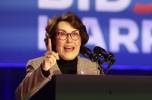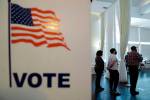Cash gives Legislature winners advantage
CARSON CITY - When it comes to winning elections, it is important for a candidate to belong to the party with the voter registration advantage. It is more important to have enough money to outspend your opponent.
In Tuesday's election, the Nevada legislative candidates who raised the most money won 82 percent of the contested races. In the state Senate, nine of the 12 contested races were won by the biggest spenders, while in the Assembly the better financed candidates won 28 of 33 races.
That should be no surprise to anyone who follows politics. Money counts.
Fred Lokken, a political science and Web college professor at Truckee Meadows Community College in Reno, said money is the "absolutely deciding factor" in winning elections.
Lokken said the view among political scientists is that money is even more important than incumbency. But generally, he added, incumbents will raise the most money.
"It doesn't guarantee you victory, but it puts you in a good spot," he said. "You want someone to run with savvy and experience. You need money for yard signs, money for mailers. The voters have to see the signs at least seven times, and you need to send out at least seven mailers for your name to register with a voter. Then in big races you need billboards, radio and TV. The costs are astronomical."
Pete Quist, a lead researcher for the Montana-based National Institute on Money in Politics, said Thursday that 76 percent of the candidates with the most money won legislative races nationally in 2010.
Incumbents did even better, he said. That year 87 percent of the incumbents were re-elected, which was down from a 94 percent winning rate in 2008. A report for Tuesday's election has not yet been prepared.
In Nevada, only one incumbent, Assembly Majority Leader Marcus Conklin, D-Las Vegas, lost in Tuesday's election. Two incumbents lost primary races in June. That means incumbents in Nevada racked up a 94 percent winning percentage in 2012.
"The most effective way to win is to be an incumbent and then to have the monetary advantage," Quist said. "Most often if you are the incumbent, you have the monetary advantage. If there is no incumbent in the race, then the monetary advantage is the biggest predictor of who wins."
Michael Ginsburg, the Southern Nevada director of the Progressive Leadership Alliance of Nevada, said it is a shame that money plays such a major role, particularly in national races.
"Incumbency and money wins," he said. "We would like to see a more level playing field. But I don't see using taxpayers' money to fund elections in a state where we cannot adequately fund education or social services."
The alliance is an umbrella advocacy organization that represents more than 40 liberal-leaning groups in Nevada.
Ginsburg said people like Sheldon Adelson and the Koch brothers spent millions of dollars but still could not win the presidency for Mitt Romney.
While rich people like them believe they can win with money, they don't know how to organize, and they aren't committed to a cause beyond their own pocketbooks, Ginsburg said.
The National Institute on Money in Politics analyzed campaign contribution statements from Nevada in 2010 and found winning Assembly candidates on average raised $146,005 while losing candidates raised $23,827.
Winning state Senate candidates raised $213,183 while losing candidates raised $102,908.
Money clearly talks.
In one example of the effect of money, and of incumbency, Reno Republican state Sen. Greg Brower carved out a 266-vote victory over former Democratic state Sen. Sheila Leslie to win the District 15 seat in Washoe County on Tuesday.
Brower raised an amazing $703,619, or about as much as what Nevada Supreme Court candidates spend in contested statewide races.
Brower needed every dollar to beat Leslie, who had raised $482,962. Lokken conjectured that if Leslie had raised as much money as Brower did, she would have picked up enough votes to beat him.
Then there was Republican Mark Hutchison in state Senate District 6 in Clark County. He raised $572,133 to beat Democrat Bennie Yerushalmi, who raised $296,152. Hutchison beat him by 901 votes. Money counted.
Nine Assembly candidates - four Democrats and five Republicans - won election without opposition.
They largely were candidates who live in districts where their party has at least a 2-to-1 voter registration margin.
The political parties did not bother competing in districts where they had no chance of winning.
There were several races Tuesday where the lower funded candidate hardly even tried.
In Assembly District 8, Jason Frierson picked up a 2-to-1 victory over Republican Arthur Martinez. Martinez spent nothing compared to Frierson's $133,198.
And in District 16, newcomer Heidi Swank, a Democrat, raised $66,403 to easily beat Republican Ben Boarman, who raised nothing.
Swank drew 71 percent of votes. She was one of five Assembly candidates who reached the 70 percent mark.
The others were District 14 incumbent Maggie Carlton, District 7 incumbent Dina Neal, District 15 incumbent Eliott Anderson and Republican winner Jim Wheeler in Douglas County's District 39.
Wheeler drew 74 percent of the vote, topping all Assembly candidates.
In the state Senate, District 4 winner Kelvin Atkinson was the biggest vote-getter, falling just shy of 80 percent.
Contact Capital Bureau Chief Ed Vogel at evogel@reviewjournal.com or 775-687-3901.
Outspent, but not out
■ Assembly District 37: In this Clark County district, Republican Wesley Duncan pulled the biggest upset of the night when he beat Marcus Conklin by 673 votes despite being outspent by more than a 3-to-1 margin, $508,831 to $148,192. With the defeat, Conklin lost a chance to become Assembly speaker. Democrats had a 307-registered voter advantage in District 37.
■ State Senate District 5: Democrat Joyce Woodhouse returned to the state Senate after a two-year absence despite being outspent by Republican Steve Kirk. Kirk raised $336,344 to her $243,054. But he could not overcome a nearly 3,500-registered voter advantage for Democrats in the district.
■ State Senate District 9: Democrat Justin Jones won this Clark County seat by 301 votes even though he was outspent by Republican Mari St. Martin. She raised $388,705 to Jones' $312,775. But Democrats outnumbered Republicans by 4,500 voters, a margin that St. Martin could not overcome with money.
■ State Senate District 1: Democrat Patricia Spearman raised $103,278 and trounced her primary election opponent, fellow Democrat John Lee, who raised $208,499. In the general election, Spearman faced only Independent American Party member Gregory Hughes, who spent $1,630. Democrats have a 2-to-1, or 14,000-registered voter advantage in a district that Republicans cannot win.
■ Assembly District 21: Democrat Andy Eisen won a 780-vote victory in this Henderson district even though Republican Becky Harris outspent him $151,598 to $105,992. Democrats hold a 2,332-registered voter lead in the district.
■ Assembly District 41: Democrat Paul Aizley won another term in this Clark County district despite being outspent by his Republican opponent, Phil Regeski, $109,832 to $77,331. Democrats hold a 2,201-registered voter advantage.
■ Assembly District 13: Republican Paul Anderson won this Clark County district over Democrat Louis DeSalvio even though his opponent raised $103,496 to his $82,968. Republicans have a 944-registered voter edge over Democrats in this district.
■ Assembly District 31: Democratic incumbent Richard Daly easily was re-elected to this Northern Nevada district even though he was outspent $149,836 to $125,100 by Republican David Espinosa. Daly won even though Republicans hold a 1,135-registered voter advantage.
Las Vegas Review-Journal























